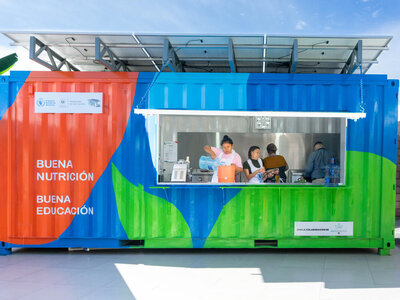Energy for food security
- 800,000
- people provided with direct access to clean cooking in 2024
- 800,000
- people provided with direct access to energy products and services for productive uses in 2024
- 180,000-plus
- fuel-efficient stoves provided to homes and schools in 2024
Energy is an engine of transformative socioeconomic opportunities that touches on every aspect of sustainable development and the ability to access energy is a fundamental enabler to achieving food security and zero hunger.
Not only is energy necessary to consume food – and most of the food that the World Food Programme (WFP) distributes to people in need requires cooking – but also throughout Food Systems to produce, process and preserve it.
WFP is implementing market-based, sustainable energy approaches that strengthen food assistance by providing people with the means to cook and communicate, and boost resilience activities that support local food value chains.
Areas of work
-
Energy in schools
-
WFP promotes clean and modern cooking in school kitchens leveraging its presence in thousands of schools where it delivers school feeding programmes. Better cooking practices reduce environmental impact and improve socio-economic outcomes. Where solar electrification is possible, it delivers additional benefits such as lighting, digital learning and refrigeration for fresh food and medicines. At the centre of communities, schools act to showcase and diffuse innovation to surrounding areas.
-
Modern cooking
-
Vouchers for energy
-
Energy for agriculture
-
Productive uses of energy – food production
-
Productive uses of energy – food processing and preservation







